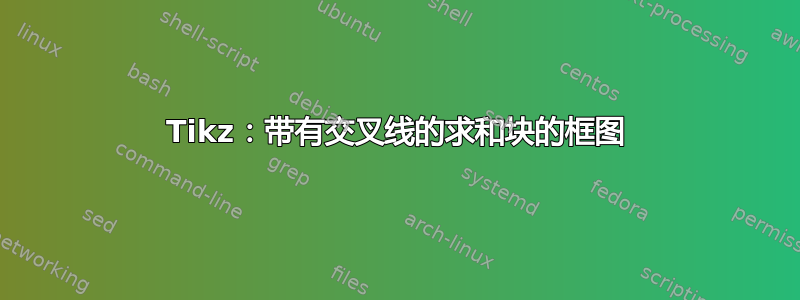
我已经制作了以下代码
\documentclass{article}
\usepackage{tikz}
\usetikzlibrary{shapes,arrows}
\begin{document}
\tikzstyle{block} = [draw, fill=white, rectangle,
minimum height=3em, minimum width=6em]
\tikzstyle{sum} = [draw, fill=white, circle, node distance=1cm]
\tikzstyle{input} = [coordinate]
\tikzstyle{output} = [coordinate]
\tikzstyle{pinstyle} = [pin edge={to-,thin,black}]
\tikzset{
charge node/.style={inner sep=0pt},
pics/sum block/.style n args={4}{
code={
\path node (n) [draw, circle, inner sep=0pt, minimum size=9mm] {}
(n.north) +(0,-1.5mm) node [charge node] {$#1$}
(n.south) +(0,1.5mm) node [charge node] {$#2$}
(n.west) +(1.5mm,0) node [charge node] {$#3$}
(n.east) +(-1.5mm,0) node [charge node] {$#4$}
;
\draw
(n.north west) -- (n.south east)
(n.south west) -- (n.north east)
;
}
}
}
\begin{tikzpicture}
\path pic at (20mm,0) {sum block={}{-}{+}{}};
\end{tikzpicture}
\begin{tikzpicture}[auto, node distance=3cm,>=latex']
\node [input, name=input] {};
\node [sum, right of=input] (sum) {};
\node [block, right of=sum] (controller) {$K_p + \frac{K_i}{s} + K_ds$};
\node [block, right of=controller,
node distance=4cm] (system) {$G_p(s)$};
\draw [->] (controller) -- node[name=u] {$u(s)$} (system);
\node [output, right of=system] (output) {};
%\node [block, below of=u] (measurements) {Measurements};
\coordinate [below of=u] (measurements) {};
\draw [draw,->] (input) -- node[pos=0.3] {Set point} (sum);
\draw [->] (sum) -- node {$E(s)$} (controller);
\draw [->] (system) -- node [name=y] {Output}(output);
%\draw [->] (y) |- (measurements);
\draw [-] (y) |- (measurements);
%\draw [->] (measurements) -| node[pos=0.99] {$-$}
\draw [->] (measurements) -| %node[pos=1.00] {$-$}
node [near end] {} (sum);
%\draw [->]
\end{tikzpicture}
上面的代码绘制了两个图形:求和块和框图。我想在第二个图形制作的框图中使用第一个图形中绘制的求和块。换句话说,我想要一个由上面的代码制作的第二个图形绘制的交叉线求和块。请告诉我怎么做
答案1
这是对 Zarko 的回答的扩展评论,我之所以写这个评论是因为我们讨论过这个问题好几次。我将其设为社区 Wiki,以明确表示我对“窃取声誉点数”不感兴趣。但是,我感兴趣的是为 OP 提供一些符合 pgfmanual 规则的内容。pgfmanual 在第 166 页上说。
我还没有见过真正需要使用它\pgfextra来绘制路径的情况。特别是,在这种情况下,你可以这样做
\documentclass{article}
\usepackage{nccmath}
\usepackage{tikz}
\usetikzlibrary{arrows.meta, % changed
calc, chains, % new
positioning, % new
quotes % new
}
\begin{document}
\begin{tikzpicture}[auto,
node distance = 6mm and 14mm,
start chain = A going right,
block/.style = {draw,
minimum height=11mm, minimum width=12mm,
on chain=A},
sum/.style = {circle, draw, minimum size=9mm,
append after command={\pgfextra{\let\LN\tikzlastnode}
(\LN.north west) edge (\LN.south east)
(\LN.south west) edge (\LN.north east)
node[left] at (\LN.center) {$+$}
node[below] at (\LN.center) {$-$}
},
node contents={},
on chain=A},
arr/.style = {-{Triangle[angle=60:2pt 3]}, semithick},
every edge quotes/.style = {font=\footnotesize, inner sep=2pt}
]
\coordinate[on chain=A] (in); % A-1
\node [sum]; % A-2
\node [block] {$K_p + \mfrac{K_i}{s} + K_ds$};
\node [block] {$G_p(s)$};
\coordinate[on chain=A] (out); % A-5
%
\draw[arr] (in) edge ["Set point"] (A-2)
(A-2) edge ["$E(s)$"] (A-3)
(A-3) edge ["$u(s)$"] (A-4)
(A-4) edge ["Output"] (out)
($(A-4.east)!0.5!(out)$) -- ++ (0,-11mm)
-| (A-2);
\end{tikzpicture}
\end{document}
请注意,使用它\pgfextra来计算某些内容或为宏分配值(如这里所做的那样)是可以的。但使用它来构造路径甚至节点则不行。
答案2
您path picture=可以向圆形节点添加所需的线条和符号:
\documentclass{article}
\usepackage{nccmath}
\usepackage{tikz}
\usetikzlibrary{arrows.meta, % changed
calc, chains, % new
positioning, % new
quotes % new
}
\newcommand\ppbb{path picture bounding box} % new
\begin{document}
\begin{tikzpicture}[auto,
node distance = 6mm and 14mm,
start chain = A going right,
block/.style = {draw,
minimum height=11mm, minimum width=12mm,
on chain=A},
sgn/.style = {circle, minimum size=3mm, inner sep=0pt, #1},
sum/.style = {circle, draw, minimum size=9mm, inner sep=0pt,
path picture={
\draw (\ppbb.north west) -- (\ppbb.south east)
(\ppbb.south west) -- (\ppbb.north east);
\node[sgn=right] at (\ppbb.west) {$+$};
\node[sgn=above] at (\ppbb.south) {$-$};
},
node contents={},
on chain=A},
arr/.style = {-{Triangle[angle=60:2pt 3]}, semithick},
every edge quotes/.style = {font=\footnotesize, inner sep=2pt}
]
\coordinate[on chain=A] (in); % A-1
\node [sum]; % A-2
\node [block] {$K_p + \mfrac{K_i}{s} + K_ds$};
\node [block] {$G_p(s)$};
\coordinate[on chain=A] (out); % A-5
%
\draw[arr] (in) edge ["Set point"] (A-2)
(A-2) edge ["$E(s)$"] (A-3)
(A-3) edge ["$u(s)$"] (A-4)
(A-4) edge ["Output"] (out)
($(A-4.east)!0.5!(out)$) -- ++ (0,-11mm)
-| (A-2);
\end{tikzpicture}
\end{document}






